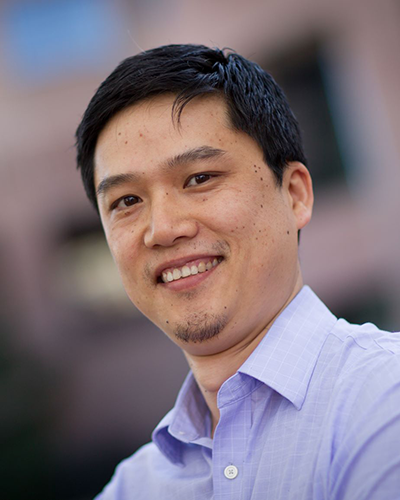Wang’s studies are fueled by interest in cells
Greg Wang is fascinated by the molecular biology of cells and the many levels of modifications they encompass to regulate gene expression.
“Follow your heart and do what interests you the most,” he said.

Wang followed his heart from China, where he earned undergraduate and master’s degrees, to the University of California, San Diego, where he pursued basic research to understand how the cell works. During his Ph.D. in biomedical sciences, he showed that nuclear receptor binding SET domain 1, a family histone methylase transferase protein, is directly linked to transcriptional regulation of the Hox-A locus and histone modification dysregulation leading to cancer formation.
Now a professor at the University of North Carolina at Chapel Hill, Wang studies a number of chromatin-modulating enzyme machineries and histone reader proteins that have been shown to be critical for chromatin/gene regulation and often altered in disease states. He also studies phase separation of transcription factors, which is critically involved in pathogenesis. For these works, he has been named the winner of the 2022 American Society for Biochemistry and Molecular Biology’s ASBMB Young Investigator Award.
“Whenever you pick a question to work on, the more fundamental and broader the question is, the more you will learn in the process of answering it,” Wang advises early-career scientists. The energy and curiosity of his students and postdocs fuel his fascination for chromatin biology, he said, and those lab members are leading his foray into molecular medicine.
The ASBMB award adds to a growing list of accolades including the Yang Family Biomedical Scholar award and the Phillip and Ruth Hettleman Prize, both from UNC in 2019; the Leukemia & Lymphoma Society Scholar award in 2018; and the American Cancer Society Research Scholar award in 2016.
Three projects with a chromatin focus
At the ASBMB annual meeting, Greg Wang will talk about his quest to answer questions in the field of chromatin biology and chromatin’s effect on gene (de)regulation and cancer formation.
Post-translational modification of histones leads to changes in the chromatin, which lead to fine-tuning of DNA-templated pathways. The misregulation of histone modifications can lead to oncogenesis due to misperception in cell identity and deregulation of gene-expression profiles. Wang was among the first to show that the deregulation of certain histone reader proteins is causal for initiating cancer.
The Wang lab also uses small-molecule inhibitors to target enzymes that modify histones. Along with collaborators, they have developed a set of epigenetic inhibitors via proteolysis targeting chimera, known as PROTAC, which can inhibit and degrade target oncoproteins in tumor cells.
Wang is also interested in how cancer cells use phase separation by acquiring mutations. This allows the cancer cells to enhance a genomic targeting of oncogenic transcription factors and to form a distorted chromatin 3D structure during tumorous transformation.
At the annual meeting, Wang will talk about his research integrating these major projects: cellular crosstalk involving chromatin regulation, phase separation that results in 3D chromatin organization and the development of small molecules to target oncoproteins in tumor cells.
2022 ASBMB award winners
Lea Michel, ASBMB Early Career Leadership Award
Marlene Belfort, ASBMB Mid-Career Leadership Award
Michael Airola, Walter A. Shaw Young Investigator Award in Lipid Research
Alex Toker, Avanti Award in Lipids
Tatyana Sharpee, Delano Award for Computational Biosciences
Tracy Johnson, Ruth Kisrchstein Diversity in Science Award
Martin Bollinger, William C. Rose Award
Joe Provost, ASBMB Award for Exemplary Contributions to Education
Walther and Robert Farese Jr., ASBMB–Merck Award
Janet Smith, Mildred Cohn Award
Kathleen Collins, Earl and Thressa Stadtman Distinguished Scientist Award
Elaine Fuchs, Bert and Natalie Vallee Award in Biomedical Science
Susan Taylor, Herbert Tabor Research Award
John Boothroyd, Alice and C.C. Wang Award in Molecular Parasitology
Enjoy reading ASBMB Today?
Become a member to receive the print edition four times a year and the digital edition monthly.
Learn moreGet the latest from ASBMB Today
Enter your email address, and we’ll send you a weekly email with recent articles, interviews and more.
Latest in People
People highlights or most popular articles

Kiessling wins glycobiology award
She was honored by the Society for Glycobiology for her work on protein–glycan interactions.

2026 ASBMB election results
Meet the new Council members and Nominating Committee member.

Simcox wins SACNAS mentorship award
She was recognized for her sustained excellence in mentorship and was honored at SACNAS’ 2025 National Conference.

From humble beginnings to unlocking lysosomal secrets
Monther Abu–Remaileh will receive the ASBMB’s 2026 Walter A. Shaw Young Investigator Award in Lipid Research at the ASBMB Annual Meeting, March 7-10 in Washington, D.C.

Chemistry meets biology to thwart parasites
Margaret Phillips will receive the Alice and C. C. Wang Award in Molecular Parasitology at the ASBMB Annual Meeting, March 7-10 in Washington, D.C.

ASBMB announces 2026 JBC/Tabor awardees
The seven awardees are first authors of outstanding papers published in 2025 in the Journal of Biological Chemistry.

